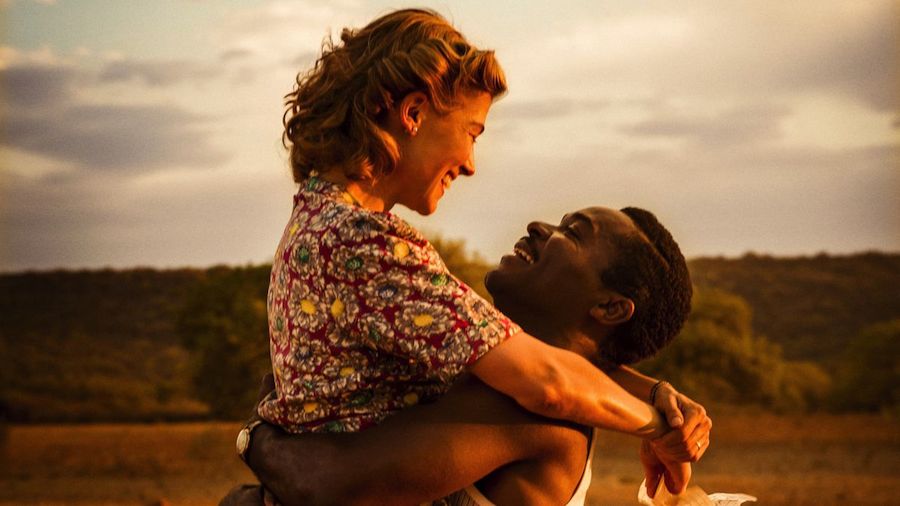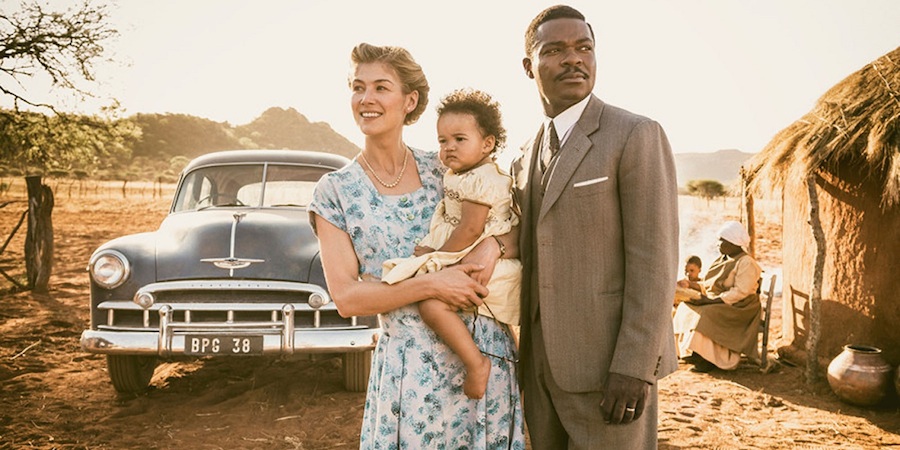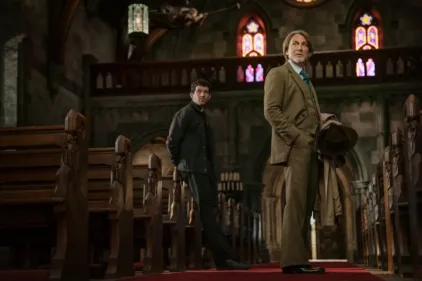“We here highly resolve that these dead shall not have died in vain; that this nation, under God, shall have a new birth of freedom; and that government of the people, by the people, for the people shall not perish from the earth.” These words were the first that moviegoers heard in the initial teaser trailer to Steven Spielberg’s “Lincoln,” and they were uttered not by Lincoln, but by a black corporal who recited the speech as a way of reminding the president to make good on his promise. That corporal was played by David Oyelowo, who was the center of his own historical drama two years later, when he delivered an unforgettable portrayal of Dr. Martin Luther King, Jr., in Ava DuVernay’s “Selma.” These roles—separated by a century of history—brilliantly illustrate the slow march toward progress and equality still being undertaken by the current generations of Americans. So many of Oyelowo’s performances have illuminated crucial yet oft-obscured chapters in our recent past, and his latest is no exception.
In Amma Asante’s “A United Kingdom,” Oyelowo plays Seretse Khama, the prince of Botswana, who draws the ire of his countrymen when he marries Ruth Williams (Rosamund Pike), a white woman from London. RogerEbert.com recently spoke with Oyelowo about the film, which he also produced, as well as spirituality, Poitier and the Method.
We first see Seretse in a boxing ring, where he exudes the raw ferocity that he must keep at simmer throughout the rest of the picture. I loved the moment during a quietly charged encounter late in the film when one of Seretse’s lines lands like a sucker-punch.
You’ve really caught what we were trying to do with that opening scene. Seretse comes off as a very stoic, dignified character who’s stomaching all of these injustices in a quiet way. That is what he had to do in order to remain politically astute. To see the fire in this man’s belly was important, both in the passion that he has for his wife and his ability to fight for that love. We also had to see what he was suppressing, in terms of what he would otherwise like to do to some of these bureaucrats and politicians who are subjecting him to fairly egregious behavior. We wanted to start the film with a fight where someone cheats and he has to deal with that. It’s symbolic of what his country had been suffering from both South Africa and Great Britain for a while.
There’s a very powerful speech that Seretse delivers to a skeptical crowd where he conveys the love that he has both for his country and his wife, and how one does not negate the other.
What Seretse has to go through in this film is a very tricky balance, historically speaking. He loves this woman who is from a different country, a different culture. You can understand why it’s problematic for him to suddenly turn up with a white queen and why people take umbrage with that. But that doesn’t diminish his love for his country. You could argue that it was selfish or naive, but at the end of the day, love is love and you can’t deny it. Of course, you can deny it, but the beautiful thing about this film and this story is that you go on to see how the love between these two people went on to make their country a better place. That particular speech you mentioned is the moment in the film where the dichotomy of the dilemma really comes to bear. Do I choose my wife or my country? Actually, there is no choice to be made here. I am both of these things and you—meaning his people—now have to choose if you want the kind of leader who is prepared to jettison love altogether. Or will love be something that we are going to celebrate and embrace within this community because it effects who we are, not just as human beings, but also myself as a leader? That’s a very nuanced, complicated idea, but it’s actually what Seretse had to face.
You’ve mentioned how the Method approach utilized by past co-stars Daniel Day-Lewis and Forest Whitaker influenced your portrayal of Dr. King in “Selma.” Was that also true of your portrayal here, and does that approach help when you are playing a real person?
What I find when I adopt the Method is that I don’t question the character’s actions in the moment. That’s what we are like in life. I wouldn’t say that we know ourselves, but that we are ourselves so much that we are just reacting to given situations. You can get pretty close to that when you spend a lot of time inhabiting the thoughts, the mindset and the disposition of any character you are playing. It was trickier for me here because when you are a producer on a film, you are in the middle of a scene and suddenly you’re having to deal with the fact that half the extras didn’t turn up and there’s a sandstorm on the way [laughs]. But I managed it because you have to. It’s a privilege making movies, in my opinion, and those are trite challenges when it comes to the transcendent nature of what it means to be able to try and tell the truth to millions of people through a film. My character in “A United Kingdom” was someone who I identified with so much that I didn’t feel the need to necessarily carry him on my back to the same degree that I did with Dr. King or the character I played in “Nightingale.” Those people are so far from who I am, but even so, when I play a role, the characters are never far away. I know this because if you talk to my wife, she can tell that someone else is sort of hovering all the time.
I’ve always sensed a soulfulness in your acting that seems to reflect your own spirituality. Do you consider acting to be a spiritual endeavor?
I do, and it’s a hard thing to articulate without coming off as corny or self-important. But in my opinion, when you go to the movies, at best, there is a spiritual connection happening between what’s happening onscreen and how you’re speaking to the audience. When you walk out of a theater and within five minutes, you’ve forgotten the nature of the movie you saw, or the characters or the story, that to me is indicative of the fact that there is no real spiritual connection. It was just a surface-level experience that distracted you for two hours. But when there is something revelatory of the human spirit onscreen, something special occurs. I truly believe that we go to the movies to see ourselves. Regardless of whether it’s a character like Seretse, who is an African prince who married a white woman 70 years ago and whose life experience may be the complete opposite of one’s own, if you can see yourself in him, then my job is done. The only way there is even a possibility of that happening is if the spiritual inner-workings of that character are emanating outward so that you, as a human being—and I mean body, soul, mind, spirit—can connect to something that the character is going through. I think that is the best of what cinema can do.

A strength of both “Lincoln” and “Selma” was in how they honed in on a specific moment in the main character’s life, and by exploring it so vividly, they made us understand the man in full.
I completely agree with you. Any life worth depicting in a film is impossible to capture within two hours, as far as showing the length and breadth of a life as rich as that of Dr. King or Lincoln. If you do cradle to the grave, it almost always is an unsatisfying experience because you’re always having to jump around and you’re not able to go in-depth. It’s much more effective if you’re able to hone in on a period of their life that is symbolic and indicative of how they lived their whole life. The three month period that we depicted in “Selma” was the most successful episode within the civil rights movement as it pertains to Dr. King, but he also goes through the ringer. You see the struggle not just between Dr. King and LBJ, but you see it within the movement itself. You see the pressures that being who he is puts on his family, and that his children and his wife are being threatened every day. You see that this is a far-reaching problem when it comes to voter registration, which is prejudiced in general. Then you have this beautiful framing of three marches—one that kind of starts, one that’s aborted and one that’s successful. It’s a snapshot that gives you an opportunity to see who the man really is, and it allows me, as an actor, to dig deep because I’m not going, “Oh gosh, we have to show him at 17 and then at 23 and then at 50.”
When working with such filmmakers as Ava DuVernay, Mira Nair and now Amma Asante, have you seen the obstacles they’ve had to face as women in the industry?
I see it first-hand because I not only talk to them, but I can feel the resistance to them from the industry when I’m fighting for them to direct movies I’m involved with. I am a beneficiary of what is unique about them, not only as female filmmakers or filmmakers of color, but Mira Nair specifically, Ava DuVernay specifically, Amma Asante specifically. They are no different from Spielberg or Christopher Nolan or Anthony Minghella, who specifically have such incredible cinematic voices. It’s absolutely the same with these women. I don’t see their talent as lesser than, and to have directors of that talent being marginalized purely on the basis of gender, sometimes on the basis of race, is highly egregious. The pleasure, for me, is to have a film like “A United Kingdom”—where the indisputable talents of someone like Amma Asante are on display—erode the excuses that she may face from other potential employers to not have her direct their movies. But the old boy’s network is very real. The biggest problem that these women face, and that we as a culture are facing, is that we are so used to a certain point of view, which is both white and male. It has become the status quo and it influences how a film like “A United Kingdom” normally gets made. Seretse’s story would usually be viewed not through his own eyes, but through the gaze of a journalist who looks nothing like the protagonist.
It’s great to see “A United Kingdom” come out mere months after “Loving,” another fact-based drama about how the love of an interracial couple had a transformative impact on their society.
I’m glad that during the 50th anniversary of “Guess Who’s Coming to Dinner,” we have these two films out right now. Both of them are about people who don’t see each other as black or white. They just fell in love, and there is very real opposition to that love. Of course, there are nuanced and very overt differences between the films, in terms of the locations and the time in which they took place, as well as who these people were. In “A United Kingdom,” you have someone who is on his way to being a king and he marries a commoner, which is already unusual in light of Great Britain and its relationship to class. Ruth marrying this black man is still seen as she’s marrying beneath herself, even though she’s marrying a king. Then you get to see in Seretse’s culture that he is marrying beneath himself not only because she’s a commoner, but because of what white people have tended to subject Africans to throughout history. That is a really interesting juxtaposition that we don’t often get to see. We don’t see black people resisting the marriage of a black man to a white person in the overt ways that we see here.
I’m married to a white woman myself, and I’ve seen how there’s very real resistance to these sorts of films getting made. It’s tough to make a film about a black man and a white woman who are married without it being in a historical context. There’s still resistance to it, even though it happens all over this country every day. This prejudice is unfortunately still with us and hopefully films like this will help in breaking that down. Film is such a powerful medium in how it shapes our culture. I wouldn’t necessarily say that it shapes people’s thinking, but it points people in certain directions and helps them resist certain prejudices.
While hearing James Baldwin’s thoughts on how Sidney Poitier represented black masculinity in “I Am Not Your Negro,” I was reminded of your character in “The Butler” and the problems he had with Poitier.
Poitier is my hero. I still scratch my head at how he was able to achieve what he achieved the way that he did when he did it. What he achieved isn’t even happening now, considering the nature of the roles he played—black men steeped in dignity who defied caricature and stereotype. In many ways, he is the North Star. It was actually very tough for me to say those lines in “The Butler,” but the way I could live with it is that you get to see my character evolve into someone who would not consider Sidney Poitier an Uncle Tom. I certainly don’t. To me, he is probably the actor that I am filled with the most admiration for.












